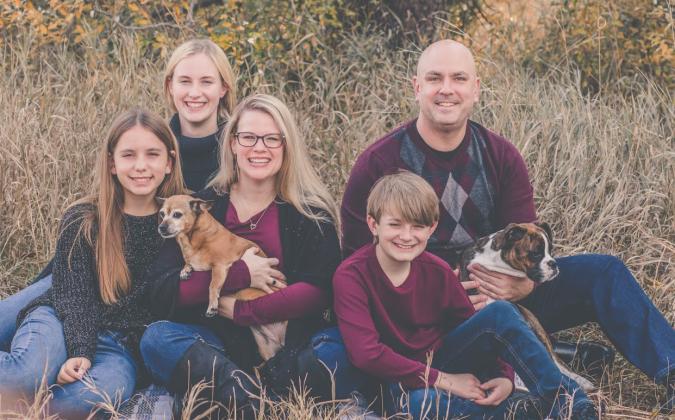Aurora grad loves career in saving children’s lives
Doctors are usually defined by their specialties and Dr. Chelsea Majerus decided to take a specialty of the most vulnerable populations at a time when seconds could mean life and death.
Majerus, a 2002 graduate of Aurora High School, works day and night as a pediatric emergency room doctor at Children’s Hospital & Medical Center in Omaha.
“We do day shifts,” Majerus said. “We do evening shifts. We do overnight shifts. We work weekends. We work holidays and so it is a sacrifice in that regard...Yes, I work crappy hours sometimes, but the converse is being able to schedule appointments with no problem... Obviously, I like caring for the kids and making them better.”
Born in Arkansas, Majerus came from a background of travelling around with her mother Denise Carr and father Charlie Majerus, spending her early life in various towns throughout the United States until settling in Aurora for her high school years.
“Both my parents are from Nebraska and so our families were all up here,” she explained. “My dad did a lot of mechanical work on pivots, so we worked a lot of farms.”
By that point, Chelsea had become a master at adjusting to new situations.
“I moved, I think, 15 times before that point,” Majerus explained. “I always credit that a little bit with my success in school because you always have to learn how to stand out a little bit or get people to know you and fit into a new school. I learned early on that being ‘the smart kid’ was one way to make that happen pretty easily.”
However, being in one spot throughout her high school time was essential for her development, she said. Even after her mother moved to Grand Island and Palmer after a divorce, Chelsea drove to Aurora to continue that sense of stability.
“It was great that we actually were there all four years,” she stated. “And I loved being able to say that I went to high school in one place.”
She played softball, basketball, threw the shot and discus in track and was involved with Future Business Leaders of America. Her interest in medicine began much earlier around the third grade.
“We had to write an essay about what you wanted to do when you grow up,” she related. “I wrote this whole big, long essay about how I wanted to be a pediatrician and I was going to own my own practice. I was going to have dogs there. So that way, when the kids came, they wouldn’t be scared.”
Finding the right medicine
Majerus studied hard and prepared for college even though she had certain disadvantages.
“You’re at a disadvantage coming from a small school like Aurora, just because we don’t have as much as the bigger schools and in big cities like Omaha,” she explained. “Although that didn’t stop me at all, I think you have to be aware of it... I was going get no support financially from my family. They just weren’t able to do that. And so going to college and medical school was all on me.”
She started out at the University of Nebraska-Omaha. She was also accepted into Harvard University, but scholarships required her to go to UNO.
The UNO experience was mostly getting down to business and waiting tables at Old Chicago.
“It wasn’t the typical ‘party all the time’ and that sort of thing, just because I had a goal to do what I wanted to do,” Majerus voiced. “I was there to learn and there to get good grades so I could go to med school.”
After getting a bachelor of science in biotechnology and a minor in chemistry, she went to medical school at the University of Nebraska Medical Center, taking an interest in the emergency room.
“I actually was interested in emergency medicine because I really liked doing procedures, trauma and doing things with my hands and getting to solve problems and stuff like that,” Majerus explained. “I think I got that from my dad, because he was a kind of MacGyver. He could fix anything.”
But a sub-internship in her fourth year of medical school dissuaded her from continuing that path in a regular emergency room.
“First and foremost is I think a lot of it is the people that would come in with certain issues and problems, it was things that they could have prevented,” she said. “All the adults that have chronic medical issues that don’t take care of themselves and then would come in and want us to just magically fix it all when they’ve not taken care of their health for 20 years. And that really bothered me because it’s like, you’re doing this yourself.”
She found her real passion in pediatrics, with children who weren’t the cause of their medical issues and she also described her love of childcare from babysitting.
She then went on to complete a pediatrics residency in Omaha that started in 2010, working with children’s emergency medicine for the first time as well as general pediatrics. She recalled that there was a learning curve.
“I mean, it’s hard because there’s so much information in your brain,” she said. “Now to be able to sift through everything in real time and try to use what I’ve learned and tie it all into what the patient was telling you and your physical exam. Residency is really tough. We had 80-hour work weeks and we did 30-hour call shifts.”
After three years Majerus went on to be chief resident, learning and teaching new residents as well. She then went to Cardinal Glennon Children’s Hospital in St. Louis, Mo., for a pediatric emergency medicine fellowship. From there she took a position at the Children’s Hospital in Omaha, the only one in Nebraska that offered emergency services for children.
“All your other friends that you’ve graduated with from high school and college have been in their real jobs for 10 years,” Majerus recalled about getting her position at the hospital in 2017. “You know, I’m just starting the real adult job, 15 years after I graduated high school, so it’s definitely surreal that you’re like, ‘Wow, I’m finally here. We made it.’”
Working in the Children’s ER
Combining her thrilling challenge of an ER with her soft spot for children, Majerus soon found her niche at the hospital, where the only constant is what is new the next day.
“One thing I like is really every day is different, every shift is different,” she said. “You never know what could walk through the door. We see your normal stuff like fevers and not feeling well and abdominal pain...We’ll see migraines, lacerations, injuries, sprains, fractures, dislocation and eye injuries. We literally cover any sort of injury that a kid could sustain and would need immediate help for.”
She does occasionally get to use service dogs to soothe children, but mostly she is on her own in working with her often emotional patients.
“I mean, you have to separate yourself from it a little bit,” she said. “It’s hard to see, when they’re crying and upset, but you just try to explain what you’re doing. I never stand up, towering over them in the bed. I try to sit down, so I’m not this big, huge giant to them. Asking the kid questions can help, like getting their opinion on things, knowing that we’re trying to help them. We just ultimately have to focus on that. Even sometimes when we cause a little bit of pain, like when we have to put an IV in or draw some blood, the ultimate goal is to make them better. You have to focus on that end goal: that you’re doing it to make them better in the end.”
She also keeps a cheery demeanor with her patients.
“Yeah, I am definitely not super serious,” Majerus explained. “I try to smile, although you can’t see me smiling with our masks that we have to wear now. If I can make a kiddo laugh, it is always gonna make things better.”
However there can be days where there are no smiles.
“That’s probably the hardest part of my job is that we do have kids that die,” she said. “There are kids that get in bad car accidents and pass away. There are people that are sick at home and things happen. My last shift I actually worked I had a kiddo that went into cardiac arrest at home. EMS was called and they came in with CPR in progress. It had just been too long that the kid had been down and so we weren’t able to save them.”
She described how she deals with those situations.
“Just understanding that we tried to do everything that we could, but knowing that unfortunately it’s part of what I do -- this is going to happen,” she said. “We do everything we can to try to minimize it, but we’re not God. We can’t save everyone. I fully believe that sometimes it is just someone’s turn to go, and no matter what I do, I can’t stop this.”
The COVID-19 pandemic caused a significant slowdown for the child-oriented healthcare facility, but the hospital has come back to life in recent weeks with a new Hubbard Center for Children, offering more room for patients.
“During the summer time of COVID, we were down to like 30 kids a day,” she explained. “So it was creepy in a way because there were some shifts that I literally saw like three patients in nine hours, which is just so different than what is normal.
“So last year, we’ve just exploded in our numbers,” she continued. “We have the new Hubbard Center built and opened October of 2021. Since then, it’s like you always hear, ‘if you build it, they will come’ and it’s very much true. Our numbers just went through the roof and we’ve been averaging anywhere from 120 to 160 kids a day.”
She has a husband, Kevin Janousek and stepchildren Mady, Emma and Ryan, as well as two dogs, Roxy the boxer and Dizzy the chihuahua-mix. Her current plans rely on when her husband retires from the military and they set off on international travel.
“He’s got about 4-1/2 years or so before he will be able to retire,” she said. “So the goal would be to cut back a little bit when he retires so we can travel and things like that. That’s one of our bucket lists that we haven’t made it to.”
But she said that for herself she will always be in medicine, learning.
“Always keep learning,” Majerus stated. “I mean, there is so much in medicine that you will never know it all. So be humble and just be willing to recognize that you don’t know everything. There is something that you could learn every single day for the rest of your life.”
And for patients?
“I would just say medicine is hard, be nice to your doctors,” she reminded.





